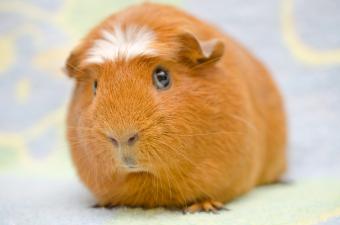
You should include variety in your Guinea pig's diet, but don't give them dairy products to eat. They're not able to digest animal-based foods, including milk, cheese, and even yogurt, like we can. A Guinea pig's diet should be made up of hay, pellets, vegetables, and fruit instead. Dairy can make your cavy very ill if they consume it. While it might look cute to offer your pet a nibble of some cheese, consider alternative snacks instead.
Lactose Is Bad for Guinea Pigs
Your Guinea pig's digestive tract can't handle lactose, which is the primary sugar in dairy products. Guinea pigs are herbivores, and eat only plant-based foods. Their digestive system gets everything it needs from hay, pelleted foods, veggies, and some fruits. They have a sensitive gut that can't process certain types of food, including dairy.
This goes for other types of dairy, even if they do not contain lactose. All dairy products are unhealthy for your cavy. One bite is not likely to harm your pet seriously, but you should make sure your Guinea pig isn't eating these items.
What About Cheese?
No, your Guinea pig can't digest cheese either. While it might be tempting to share a piece of cheese or a spoonful of yogurt, doing so could lead to negative health effects. Your piggy could experience bloating, diarrhea, and stomach pain. In severe cases, dairy consumption could even lead to critical digestive issues that require your vet's attention.
What To Do if Your Guinea Pig Eats Dairy
If you accidentally give your Guinea pig some kind of dairy product, watch for signs of an upset stomach. This could include watery stools, lethargic behavior, or lack of appetite. However, if you suspect your cavy had some dairy, don't wait for symptoms to show up before contacting your vet. Give them a call and let them know what happened. Then, if your pet has any signs of an upset stomach, they will know what to do.
If you suspect your pet ate something with dairy in it, keep a watch out for signs of bloat, and call your vet right away. This is a life-threatening issue for your Guinea pig.
Make Sure Your Guinea Pigs Get Enough Calcium

Cavies still need calcium (just not from dairy products). It is beneficial for a Guinea pig's overall health, helping them to build strong bones and teeth. Instead of feeding dairy to add calcium to their diet, offer dark, leafy greens, including kale and spinach. You can also offer your piggy some veggies, such as broccoli and bell peppers, to add some variety to their diet.
What Your Cavy's Diet Should Include
A balanced, healthy diet for your Guinea pig should consist of grass hay, pellet-based feeds, fresh vegetables, and an occasional treat of fresh fruit. Timothy hay makes up the majority of their diet. You should give your Guinea pig enough so they have access to hay at all times. Guinea pig pellets are specifically formulated for these animals and provide a rich source of essential nutrients.
Feed the Right Diet
By feeding your pet plant-based foods, you can make sure they stay happy and healthy. Adding variety to their diet isn't always a bad thing, but you should make sure what you feed your Guinea pig is on the list of accepted foods. As a guideline to start, any animal-based product will always be a no-go for your Guinea pig.






